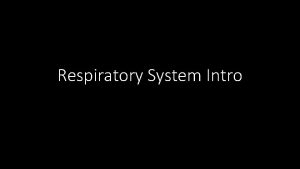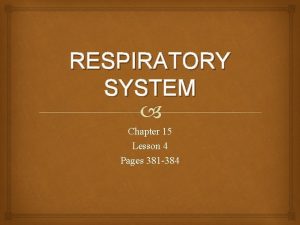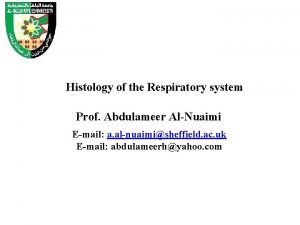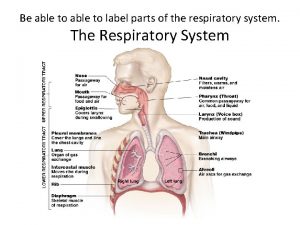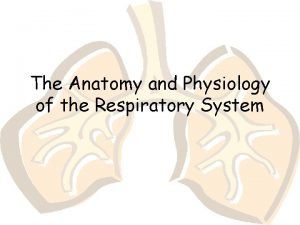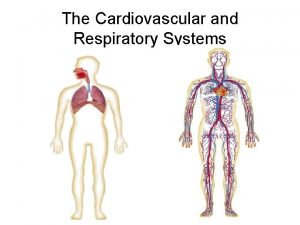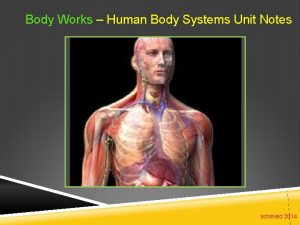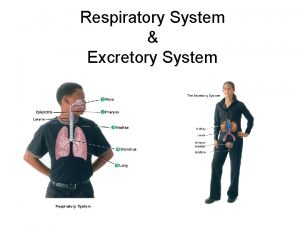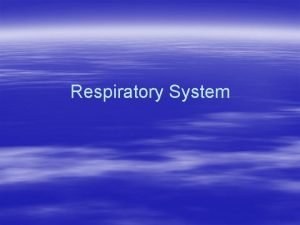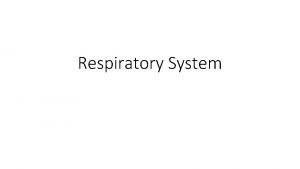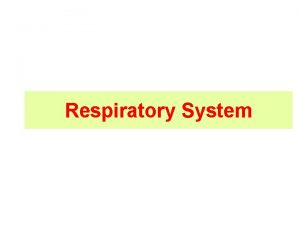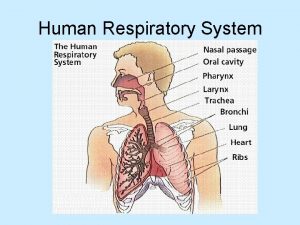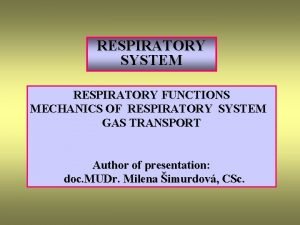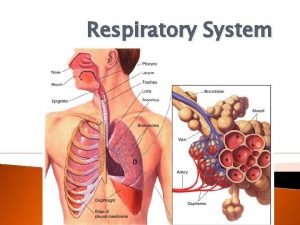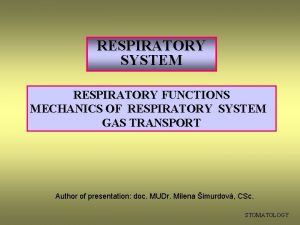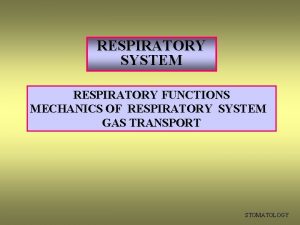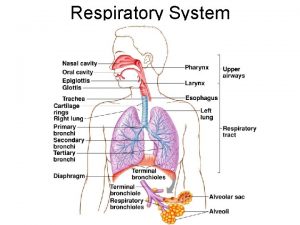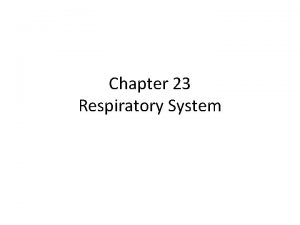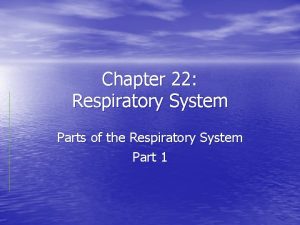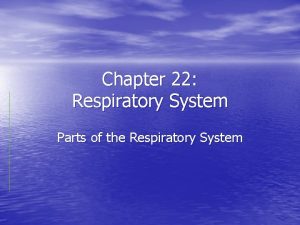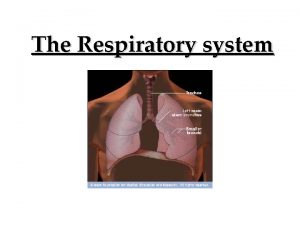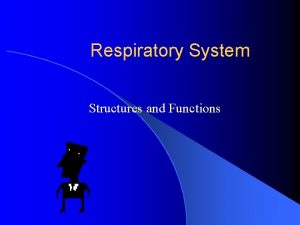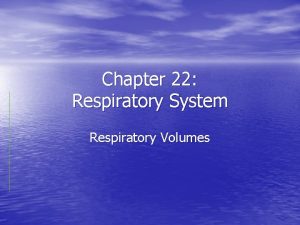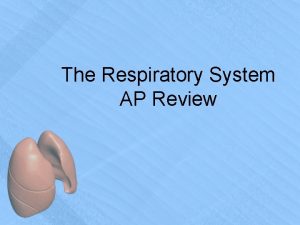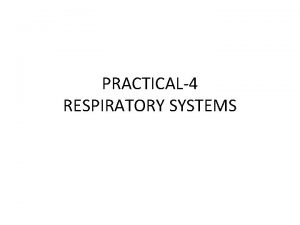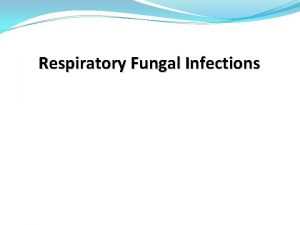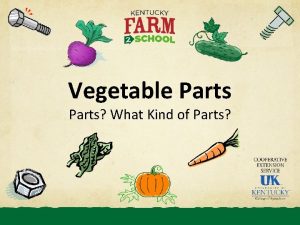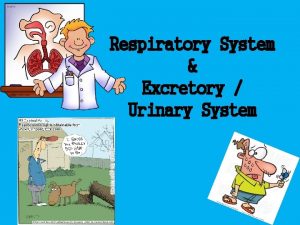The Respiratory System Parts of the Respiratory System



































- Slides: 35

The Respiratory System

Parts of the Respiratory System • Lungs: • Provide the body with oxygen • Eliminate carbon dioxide from blood • Respiratory Tract: • Passageways through which air moves in and out of the lungs • Muscles: • Move air into and out of lungs

Internal vs. External • External Respiration: the exchange of oxygen from the air around us into our lungs and the removal of carbon dioxide from the lungs via the respiratory tracts

Internal vs. External • Internal Respiration: the exchange of oxygen from the alveoli in the lungs to the bloodstream and all other cells of the body during inspiration, and the movement of carbon dioxide (CO 2)

Anatomy of the Lungs • Pleura: outside of the lungs • Moist, double layer of membrane • Help make lung movement easier by protecting lungs and providing moisture • Outer layer: parietal pleura • Inner layer: Visceral pleura • Space between the two layers: pleural cavity

Anatomy of the Lungs • Lobes of the Lung: • Right Lung: three lobes • Left Lung: two lobes

Respiratory Passageways The Nose: • Divided into two cavities by a piece of cartilage (nasal septum) • While passing through the nasal cavity, air is warmed by blood vessels in the area • Foreign bodies are also filtered out of the inhaled air by small hairs in the nasal cavity called cilia

Respiratory Passageways The Throat: also known as the Pharynx • Passageway for both air and food • Divided into three sections: • Nasopharynx • Oropharynx • Laryngopharynx

Respiratory Passageways Nasopharynx: lies above the soft palate Oropharynx: back portion of the mouth • Contains the tonsils (palatine tonsils) which act in immunity • Part of the mechanism of the mouth that triggers swallowing Laryngopharynx: bottom of the throat • Respiratory tract divides into esophagus and trachea

Nasopharynx Oropharynx Laryngopharynx

The Esophagus: passageway for food • Epiglottis: small flap that prevents food from going into the larynx • Aspiration: occurs when you swallow and inhale at the same time, causing some food to be pulled into the larynx. (Coughing usually forces out food, but choking may occur)

The Larynx: Voice box • Area in trachea where sounds and speech are produced • Contains Vocal Cords

The Trachea: • Tube that connects larynx to the left and right bronchi • Bronchi are passageways that air travels through to get to the left and right lung • After splitting into left and right bronchus, each one splits off more and more, becoming smaller until they reach their smallest size, known as bronchioles

Trachea

The Alveoli: • Located in clusters at the end of each bronchiole • Connect to small blood vessels called capillaries • Oxygen is exchanged from the alveoli into the capillaries and to the rest of the bloodstream • CO 2 is expelled back out of the blood, through the alveoli and out of the respiratory tract during exhalation Animation!!



Muscles for Breathing • Contractions enlarge the volume of the thoracic cavity during inspiration and decrease the volume during expiration • Major muscles involved: • Diaphragm • Intercostals Animation!!

Diseases and Disorders • Because this system can be exposed to foreign material coming in from the outside, it can often become inflamed or infected • When part of the respiratory system becomes inflamed, we usually name the disease by naming the area inflamed and adding the suffix -itis

Bronchitis • Inflammation of the bronchi • Increase of secretion from mucus membranes of the bronchi • Chronic Bronchitis: Occurs over a long period of time • RESULT: secretions obstruct breathing • CAUSES: allergies, dust, infections, pollution

Asthma • Bronchial airway obstruction • Causes sudden breathing difficulty accompanied by wheezing and coughing • Attack may be caused by allergy, infection or anxiety

Emphysema • Often affects the elderly, especially adults who smoke heavily and those with asthma or chronic bronchitis • Unable to exhale the full amount of air from their lungs • Causes carbon dioxide to build up • Damages alveoli • Breathing becomes difficult-shortness of breath

Chronic Obstructive Pulmonary Disease (COPD) • Any disease that causes chronic obstruction of the bronchial tubes and lungs • Chronic bronchitis, emphysema

Hemoptysis • Coughing up of blood in the lungs or bronchial tubes • Can occur with chronic lung diseases • Tuberculosis, lung cancer, trauma

Lung Cancer • Leading cause of cancer death in both males and females • Caused by exposure to carcinogens (smoke from cigarettes) • Early stages-no symptoms • Later stages-hemoptysis, dyspnea, weight loss and chest pain

Upper Respiratory Infection • Viral infection of part or all of the upper respiratory tract • More commonly known as the common cold • Highly contagious • Sneezing, watery eyes, sore throat, cough • No cure • Bed rest, cold medicines

Epistaxis (nosebleed) • Results from trauma, rupture of a blood vessel in the nose • First aid includes having the client remain calm and lean their head slightly forward • Pinch nostrils toward the nasal septum • Apply cold compress to bridge of nose • Seek medical attention if bleeding continues

Pneumonia • Inflammation and infection of the lungs • Often affects bedridden, elderly and frail people

Tuberculosis • Highly infectious disease • Caused by a bacteria called bacilli • Invades the lungs and causes small swellings and inflammation

Anthracosis • Black lung • Caused by coal dust in the lungs • Threat to coal miners

Pleurisy • Inflammation of the pleura • Causes sharp, stabbing pain while breathing, dyspnea, fever and grating sounds in the lungs when breathing (crepitation)

Influenza • Also known as the flu • Occurs suddenly, caused by a virus • Induces fever, chills, body aches, sore throat and fatigue

Affects Diseases have on breathing • Bradypnea: slow breathing • Tachypnea: fast breathing • Hypopnea: shallow breathing • Hyperpnea: abnormally deep breathing

Affects Diseases have on breathing • Dyspnea: difficulty breathing • Apnea: inability to breathe • Orthopnea: difficulty in breathing, especially when lying down

Affects Diseases have on breathing • Cheyne-Stokes respiration: irregular breathing pattern • Apnea • Followed by deep, labored breathing • Then becomes shallow • Returns to apnea • Can indicate impending death
 Respiratory zone of the respiratory system
Respiratory zone of the respiratory system Chapter 15 lesson 2 the respiratory system
Chapter 15 lesson 2 the respiratory system Histology respiratory system
Histology respiratory system Label parts of the respiratory system
Label parts of the respiratory system Digestive system respiratory system and circulatory system
Digestive system respiratory system and circulatory system Upper respiratory system labeled
Upper respiratory system labeled Tiny air sacs at the end of the bronchioles
Tiny air sacs at the end of the bronchioles Circulatory system and respiratory system work together
Circulatory system and respiratory system work together Hát kết hợp bộ gõ cơ thể
Hát kết hợp bộ gõ cơ thể Frameset trong html5
Frameset trong html5 Bổ thể
Bổ thể Tỉ lệ cơ thể trẻ em
Tỉ lệ cơ thể trẻ em Gấu đi như thế nào
Gấu đi như thế nào Tư thế worms-breton
Tư thế worms-breton Alleluia hat len nguoi oi
Alleluia hat len nguoi oi Kể tên các môn thể thao
Kể tên các môn thể thao Thế nào là hệ số cao nhất
Thế nào là hệ số cao nhất Các châu lục và đại dương trên thế giới
Các châu lục và đại dương trên thế giới Công thức tiính động năng
Công thức tiính động năng Trời xanh đây là của chúng ta thể thơ
Trời xanh đây là của chúng ta thể thơ Cách giải mật thư tọa độ
Cách giải mật thư tọa độ Phép trừ bù
Phép trừ bù Phản ứng thế ankan
Phản ứng thế ankan Các châu lục và đại dương trên thế giới
Các châu lục và đại dương trên thế giới Thơ thất ngôn tứ tuyệt đường luật
Thơ thất ngôn tứ tuyệt đường luật Quá trình desamine hóa có thể tạo ra
Quá trình desamine hóa có thể tạo ra Một số thể thơ truyền thống
Một số thể thơ truyền thống Cái miệng nó xinh thế chỉ nói điều hay thôi
Cái miệng nó xinh thế chỉ nói điều hay thôi Vẽ hình chiếu vuông góc của vật thể sau
Vẽ hình chiếu vuông góc của vật thể sau Thế nào là sự mỏi cơ
Thế nào là sự mỏi cơ đặc điểm cơ thể của người tối cổ
đặc điểm cơ thể của người tối cổ Thế nào là giọng cùng tên? *
Thế nào là giọng cùng tên? * Vẽ hình chiếu đứng bằng cạnh của vật thể
Vẽ hình chiếu đứng bằng cạnh của vật thể Fecboak
Fecboak Thẻ vin
Thẻ vin đại từ thay thế
đại từ thay thế
